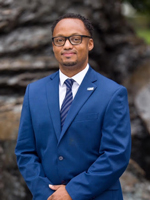CSEd Week Teacher Spotlight: David Lockett
December 13, 2020
CS Ed week is an annual event that aims to inspire K-12 students to learn computer science. All this week, we’ll be taking the opportunity to celebrate the contributions of some amazing K-12 teachers who are working to expand computer science learning in the schools and classrooms where they teach.

David Lockett
Albert Einstein Distinguished Educator Fellow Washington, D.C.
Tell us about yourself
I am a middle school STEM and computer science teacher at Bok Academy in Lake Wales, Florida. I’m currently serving a fellowship at the National Aeronautics and Space Administration (NASA) in the Office of STEM Engagement. For the past three years, I’ve implemented a variety of astronomy-based projects including the Bok Small Radio Telescope (BSRT). The project focused on naturally occurring radio light from stars, galaxies, and other astronomical objects. I’m also the recipient of the International Society of Technology in Education STEM Professional Learning Network Award, which is awarded to STEM teachers that have displayed leadership and advocacy in understanding and advancing the authentic use of STEM in education. I believe that as a STEM teacher, accessible instruction and technologies that promote student equity and engagement, collaboration, and problem-solving is key. I’m very active with national efforts to provide more STEM role models for students and build stronger connections to the professional scientific community.
Why did you go into teaching?
I went into teaching because careers in STEM offer opportunities to use a wide range of skills that include math, science, technology and engineering — and beyond. The opportunity to engage students in and find careers that are interesting, challenging, and productive is key. According to the United States Department of Commerce, jobs in STEM-related fields have grown 25% over the last decade.
Why is it important to teach your students computer science and maker education?
Providing access to computer science and maker education career paths opens students of all ability levels and interests. STEM-based education teaches children more than science and mathematics concepts. 21st-century skills include media and technology literacy, productivity, social skills, communication, flexibility and initiative. There are fulfilling career paths open to students of all ability levels and interests in the world of computer science and making.
How do you integrate computer science and making into your classroom?
I have integrated CS and making into classroom learning through problem solving, critical thinking, creativity, and curiosity. Taking an integrated and interdisciplinary approach to computer science and making provides hands-on and relevant learning experiences for all students.
This year’s theme for CS Ed Week is #CSforSocialJustice. What does that theme mean to you?
Ensure access and equity to CS. Addresses inequities as components of a larger system. Meaningful CS education should teach students not only to use the tools of computer science, but also to critically reflect on how they and others use these tools. This is a tremendous opportunity for students to engage in the work of social justice through computer science. Teachers can foster social justice in ways that help students recognize and engage diverse cultures, build social justice awareness, and provide an opportunity to reflect experientially.
What needs to be done at the national level to achieve computer science for all?
Computer science provides the advanced skills needed in an increasingly knowledge-intensive, and innovation-focused economy and society. Many studies highlight the need for a renewed focus on CS education to maintain the economy. With the digital age currently evolving, developing a forward thinking and problem-solving approach is ideal. At the national level we need to strengthen CS literacy by engaging and building capacity with professional training, particularly those from groups that have been traditionally underrepresented in CS fields.
Is there anything else you’d like to share?
Innovative thinkers have the potential to change the world. Encourage and prioritize unique learning experiences and provide the real-world application necessary for developing an innovative mindset for all students.






